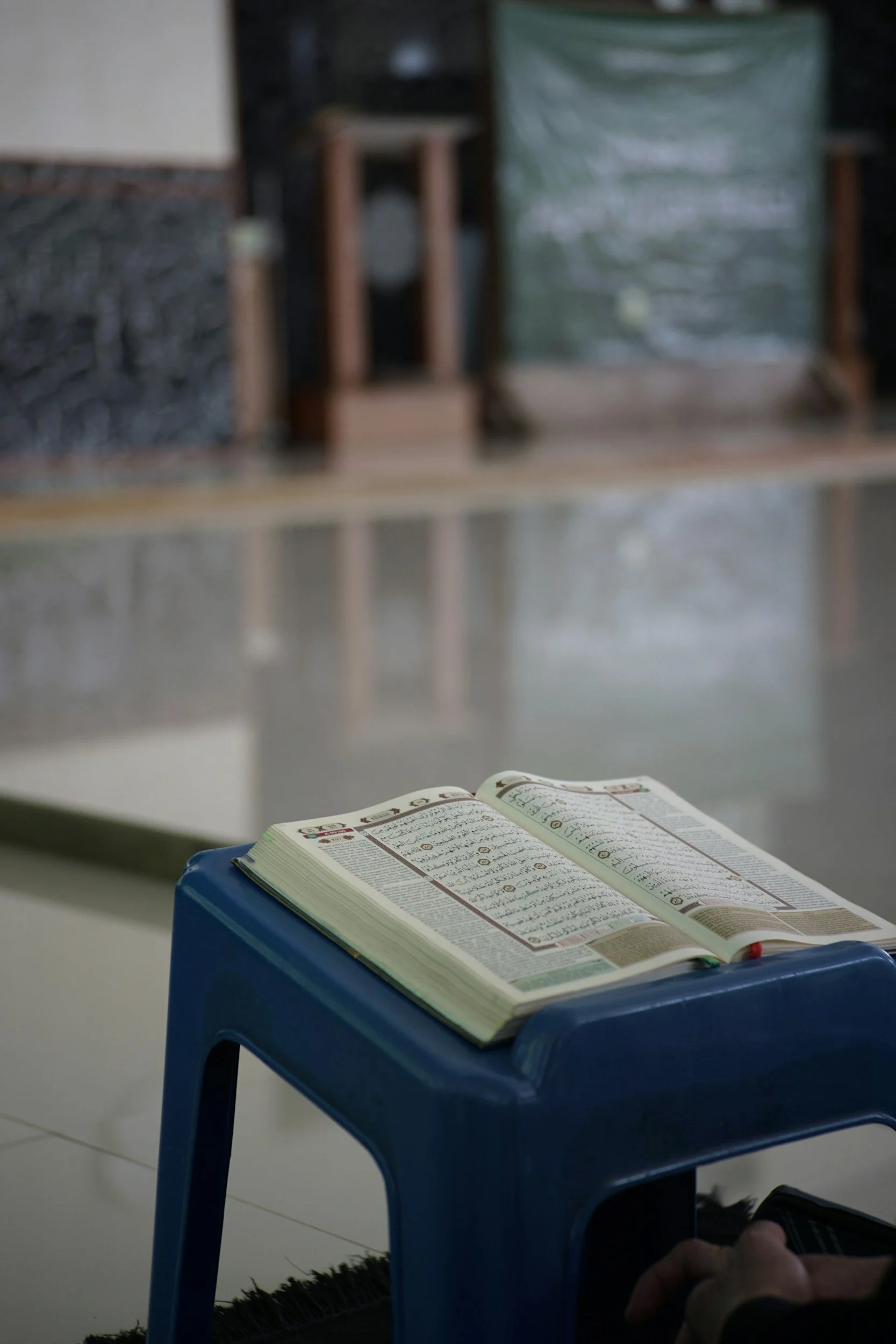Revert’s Corner
Where Do I Start?
-

A Comprehensive Guide For The New Muslim
Our brother and teacher Anwar Wright goes through important topics the new Muslim must be aware of. Listen to one of these lessons each day for 1 month and you’ll have laid a great foundation - by Allāh’s permission!
-

How To Perform Wuḍū'
Wudûʾ is a prerequisite of the prayer, meaning being in a state of ritual purity is a must before the prayer can be correctly established. It is important you take time to watch the video demonstration and perform the various steps for practice.
-

How To Perform The Prayer (Ṣalāh)
Prayer is the second pillar of Islām. It is an obligation upon every Muslim that has reached the age of puberty - 5 times daily.
Note: the prayer of the men and the women is the same! As the Messenger (ﷺ) mentioned “pray as you have seen me pray“.
-

Access Translation of The Meanings of The Book of Allāh In Your Language
Read the translated meanings of the Words of your Lord, Allāh, in your language. The Qurʾān was revealed to be reflected upon.
-

Conditions of The Ḥijāb of The Muslim Woman
Brief points of benefit outlining what is obligatory with regards to the Ḥijab of the Muslim woman.
-

The Names and Attributes of Allāh
Learn and understand the Names of Allāh and His Attributes. What they mean, how to correctly believe in them, and other details regarding the subject.
Learn About The Messenger; Muḥammad - ﷺ
-

Introduction: The Life of The Prophet in Years
The early years of the Messenger (ﷺ). In this lesson, the teacher, brother Bilāl ibn Aḥmad, Abû Ḥakīm, goes through the years in the life of the Messenger of Allāh -ﷺ- before his prophethood from ages of 4 to 40.
-

Years 1 - 4 After Prophethood
Looking into the beginning stages of the prophethood. The point that the Prophet Muḥammad - ﷺ- was made a Prophet, and when he was made a Messenger of Allāh. The Daʾwah As-Sirriyyah ( Secret Calling to Islām).
-

Years 4 and 5 After Prophethood
This lesson looks at the various offers of the Quraysh [The Makkans] to Allāh’s Messenger -ﷺ- in order to convince him to stop his Daʾwah. Also, the lesson gives some detail on the first migration of the Muslims to Abyssinyah.
-

Years 5 - 10 After Prophethood
This lesson shows focused on some of the incidents that occurred between the Messenger of Allāh -ﷺ- and the Quraysh [The Makkans]. Additionally, in this lesson, we see some of the miracles Allāh sent His Prophet -ﷺ- with.
-

(Years 10 - 13) The Latter Years In Makkah
This lesson looks at the ascension and night journey of The Messenger of Allāh -ﷺ-, and the latter years of the Daʾwah in Makkah before the Hijrah (Migration) of Allāh’s Messenger from Makkah to Al-Madīnah.
-

Yr 13 After Prophethood to Yr 3 After Hijrah:
This lesson focused on key events from 1–3 A.H., including the Hijrah, building of the first Masājid, and major battles. Additionally, in this lesson, we see new legislations, family migrations, marriages, deaths, and prohibitions revealed by Allāh.
-

Years 2 - 4 After the Hijrah
This lesson looks at the battles of Badr and Uḥud, highlighting the Muslims’ reliance upon Allāh, angelic support Allāh sent, and the martyrdom of many Companions. Additionally, in this lesson, we see some of the betrayals, broken ties and more.
-

Years 5 & 6 After the Hijrah
This lesson covers the battle of Banū Muṣṭaliq, the story of al-Ifk, the Battle of the Trench, and Banū Quraydhah. Additionally, in this lesson, we see treaties, new legislations, miracles, marriages, and Daʿwah to Heraclius.
-

Years 7 - 11 After the Hijrah
This lesson focused on the 7th–11th years after the Hijrah, covering Khaybar, the Conquest of Makkah, and the battles of Ḥunayn, Ṭā’if, and Tabūk. It also highlighted the Islām of notable Quraysh members, the Farewell Ḥajj, the passing of the Messenger -ﷺ-, and more.
Fundamental Beliefs of A Muslim
-

Introduction
Abū ʿĀ’ishah Shams ad-Dīn (حفظه الله) reads the introduction of Shaykh Ṣāliḥ Al-Fawzān (حفظه الله)’s short yet comprehensive book on creed.
-

Names of the 'Saved Sect' and Their Meaning
Shaykh Ṣāliḥ Al-Fawzān (حفظه الله) explains who the Saved Sect are, and explains how to be safe and free from deviation.
-

Belief In Allāh
Who is your Lord, and what is the correct way for Muslims to believe in Allāh. 10 Minutes and 40 Seconds.
-

Belief In The Angels
What are the Angels? What do they do and what is the correct way for Muslims to believe in them. 5 Minutes and 10 Seconds.
-

Belief In The Books
What Books did Allāh reveal? Do we believe in the Bible of today? What is the correct way to believe in the revealed books? 10 Minutes and 53 Seconds.
-

Belief In The Messengers
What is the role of the Messengers? The correct way for Muslim to believe in the Messengers that Allāh sent. 9 Minutes and 56 Seconds
-

Belief In The Last Day & Reminder
What takes place after death? Where would you like your final destination to be in the next life? Powerful reminder!
-

Belief In Pre Decree (al-Qadar)
The Preserved Tablet, why the creation were created by Allāh. The correct belief of the Muslim regarding pre decree. 7 Minutes 38 Seconds
-

Our Belief Concerning al-Ēmān
The belief of Ahl as-Sunnah (The People of Sunnah) concerning Ēmān (True Faith); that it increases and decreases, etc.
Beware Of …
-

Excommunicating Muslims From Islām
The belief of Ahl as-Sunnah (The People of Sunnah) regarding Takfīr. Can anyone engage in it?
-

Disobeying The Muslim Rulers
The belief of Ahl as-Sunnah (The People of Sunnah) regarding obedience to the Muslim rulers & leaders.
-

Speaking Ill of Companions
The belief of Ahl as-Sunnah (The People of Sunnah) regarding the Companions of Allāh’s Messenger -ﷺ.
-

Having Love For Ahl al-Bayt
The correct belief regarding Ahl al-Bayt (The Household of The Prophet - ﷺ
-

Not Believing In The Miracles of The Awliyā'
Do we disbelieve in miracles? How do we differentiate between miracles and witchcraft?
-

Following The Qurʾān and The Sunnah
The People of Sunnah and their relationship with the Qurʾān and the Sunnah.

